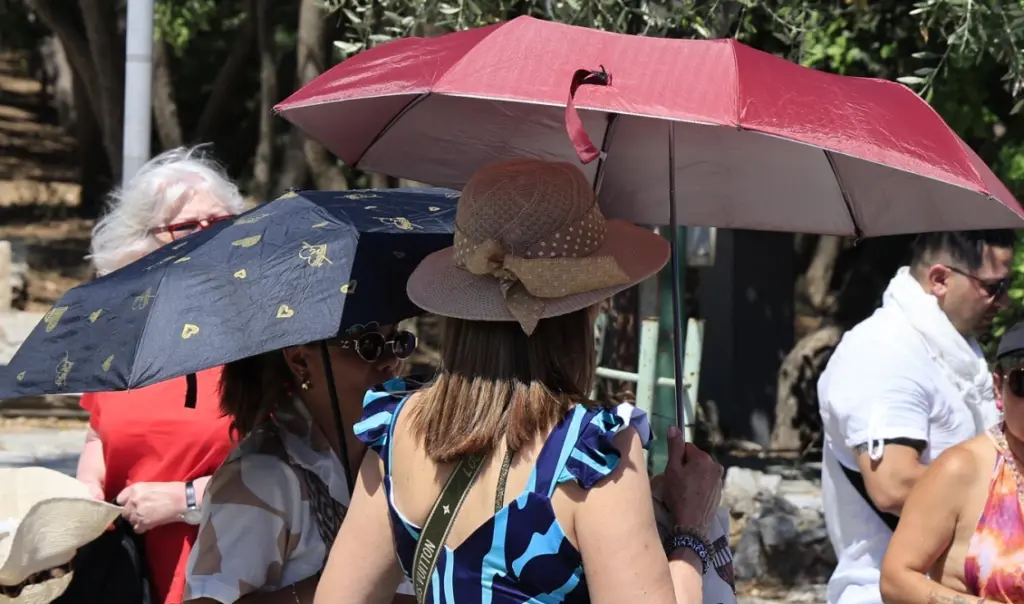According to the new updated emergency weather bulletin from the Greek Meteorological Service, after the extremely high temperatures, Thursday will bring a noticeable temperature drop across almost the entire country and strong winds in the Ionian Sea and locally in mainland areas. Very strong northeastern winds will prevail temporarily during Wednesday night into Thursday in eastern Macedonia, Thrace, and the northeastern Aegean.
Greek Meteorological Service: Complete weather deterioration bulletin
Temperature:
Today Wednesday, maximum temperature values will reach:
a) in the eastern mainland areas 38 to 40 degrees, and in eastern Central Greece and eastern Peloponnese locally 41 degrees Celsius.
b) in the Eastern Aegean islands, Dodecanese and Crete locally 37 to 38 and possibly 39 degrees Celsius.
It is noted that:
A. In coastal areas of mainland Greece, the maximum temperature will be 2 to 4 degrees lower than the temperature in the interior of mainland Greece.
B. Relative humidity will remain at low levels (indicatively 20% to 30% during midday hours in the interior of mainland areas).
2. Winds:
a) Strong western winds will blow until evening in eastern Peloponnese, eastern Central Greece and Thessaly.
b) Very strong northwestern winds will prevail from this afternoon in the Ionian Sea and western mainland areas, from early evening in central Macedonia (including the Thessaloniki area) and at night in eastern Thessaly and the Sporades.
c) Very strong northeastern winds will prevail temporarily during Wednesday night into Thursday in eastern Macedonia, Thrace and the northeastern Aegean.
Country “boils” at 41 degrees Celsius – Emergency worker protection measures in effect
Specifically, today’s weather will be clear in almost all of the country, with few local clouds in Macedonia and Thrace, where there is a possibility of local rain or thunderstorms in the north. Winds will initially blow from the west at 3-5 Beaufort, but will strengthen in the afternoon to 6-7 Beaufort and in the evening will turn to northerly winds with intensity up to 8 Beaufort in some areas.
Temperature will reach up to 35-36 degrees in western Greece, while in eastern and southern mainland areas, as well as in Aegean islands and Crete, it will reach even 40-41 degrees. In Attica the weather will be clear, with temperature up to 39 degrees and winds 3-6 Beaufort. In Thessaloniki it will also be generally clear with few clouds and temperature up to 38 degrees, while winds will strengthen in the evening.
Detailed worker protection measures
Due to the intense heatwave affecting the country, businesses continue to implement special measures to protect their workers. Specifically, the directive provides for the following:
– Protection measures for thermal stress
Private sector employers must apply technical and organizational measures according to circular 34666/03.06.2024, for the prevention of thermal stress in workers.
– Mandatory suspension of outdoor work
In areas with very high temperatures (e.g. Attica, Thessaloniki, Serres, Halkidiki, Magnesia, Phthiotida, Boeotia, Euboea, Argolida, Laconia, Chania, Rethymno, Samos, Chios, eastern Lesvos, eastern Rhodes and lowland areas of Evros), manual work in outdoor spaces is prohibited from 11:00 to 17:00, such as technical projects, construction sites, shipyards, deliveries by motorcycle, etc.
The measure applies to all workers, including those working on digital platforms (delivery). However, order taking with store pickup (takeaway) and the use of air-conditioned vehicles except motorcycles is permitted. Critical infrastructure such as health, transport, water supply and public services are exempt, provided protection measures are implemented.
In case of non-compliance, a fine of 2,000 euros per worker is imposed by the Labor Inspectorate.
– Remote work for high-risk workers
Businesses must provide the opportunity for high-risk workers exposed to difficult conditions to work remotely, when possible.
-Work time organization
To facilitate workers in high-risk areas, employers can change work schedules without requiring prior registration in the ERGANI system.
Country on red alert: Very high fire risk continues today
The day is characterized as extremely serious according to the official Risk Forecast Map published by the General Secretariat of Civil Protection, as many areas of the country are in a state of alert, with risk category 5 where extreme fire conditions develop. Regions such as Attica, Central Greece, Peloponnese and Thessaly are in the “red zone”, while other areas, both island and mainland, from Western Greece to Macedonia, Thrace and Crete, the risk remains very high in category 4.
Detailed air-conditioned spaces in Attica
As Attica is hit by the first intense heatwave of this summer with temperatures reaching up to 42 degrees Celsius, the Region’s municipalities are taking measures to protect citizens. Air-conditioned halls specially designed to host vulnerable groups such as elderly, homeless and people with health problems are operating.
The Municipality of Athens activates seven Friendship Clubs in each Municipal District, which are open from 9 am to 9 pm. The Municipality of Piraeus, in cooperation with the UNESCO Club of Piraeus and Islands, operates the “Piraeus Dormitory – Port of Solidarity” 24 hours a day for the homeless.
In Agia Paraskevi an air-conditioned hall operates at the Town Hall from 8 am to 8 pm, while in Peristeri two Friendship Centers open with similar hours. In Agia Varvara, there is an air-conditioned space at the Elderly Day Care Center.
The Municipalities of Agioi Anargyroi – Kamatero, Aigaleo, Aspropyrgos and Acharnes have corresponding spaces, with the Municipality of Acharnes offering 24-hour protection at the Town Hall. In Vari – Voula – Vouliagmeni, air-conditioned spaces will remain open until July 10, while in Vrilissia, the “Nikos Engonopoulos” space in Mikis Theodorakis park operates daily from 9 am to 9 pm.
In Vyronas, the air-conditioned hall of the Multipurpose Welfare Center is available with hours 9:00 to 21:00. In Galatsi operates the “Thanos Kotsopoulos” hall with hours 8:00-21:00. Glyfada has air-conditioned spaces at the KAPI of Agios Tryfon and Agios Nikolaos, where water, coffee and soft drinks are also offered.
In Dafni – Ymittos and Elefsina, the respective air-conditioned halls operate with hours mainly from morning to evening, while in Zografou, apart from the Town Hall, the Municipal Library and two KAPI are also open.
In Ilioupoli air-conditioned spaces operate with extended hours, while the Municipality of Kaisariani keeps the A’ KAPI open from 8:00 to 20:00. The Municipality of Kallithea offers air-conditioned space on Platonos Street from noon to evening, while at the Town Hall they operate 24 hours a day.
The Municipalities of Keratsini – Drapetsona, Marathon, Megara, Moschato – Tavros, Nea Ionia, Nikaia – Agios Ioannis Rentis have also announced air-conditioned spaces with hours that vary according to needs and local conditions.
Citizens belonging to vulnerable groups or facing problems due to the heatwave are called to be informed and make use of these spaces, while the Municipalities provide telephone support for emergencies and additional information.
How to protect yourself from the heatwave – Health Ministry recommendations
The Ministry of Health issued a special circular with heatwave protection guidelines, as particularly high temperatures are expected in the coming days. The adverse weather conditions, worsened by humidity and lack of wind, may seriously burden citizens’ health, especially those belonging to vulnerable groups. As noted in the circular, symptoms and risks from exposure to high temperatures include headache, intense fatigue, lethargy, nausea, vomiting, tachycardia, blood pressure drop, dizziness and tendency to faint.
In more serious cases, heat stroke may occur, with body temperature above 40.5°C, dry and red skin without traces of sweat, intense confusion, spasms or even loss of consciousness. Early recognition of the above symptoms and their immediate treatment is vital for protecting human life.
Basic heatwave protection guidelines include staying in cool or air-conditioned spaces, avoiding sun exposure during hot hours of the day –especially from 11.00 to 17.00– and choosing light, light-colored clothing and a hat. Frequent cool showers, consumption of plenty of fluids such as water and natural juices are also recommended, while alcohol and consumption of heavy meals should be avoided. People with chronic diseases are called to contact their treating physician for possible adjustment of medication, while special emphasis is given to caring for elderly and vulnerable people through regular communication and supervision.




